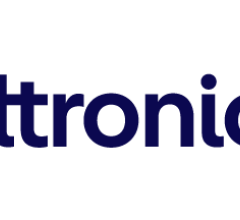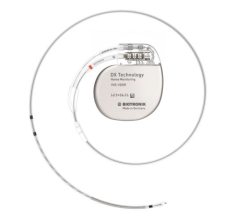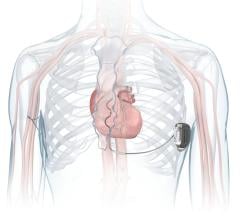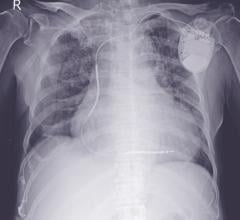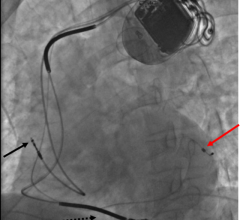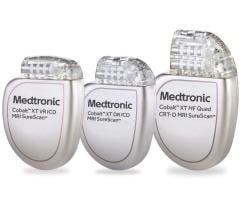
December 31, 2012 — St. Jude Medical Inc. (announced European CE mark approval of the Assura portfolio of implantable cardioverter defibrillators (ICDs) and cardiac resynchronization therapy defibrillators (CRT-Ds). The Assura family of devices, featuring Shockguard technology has three new algorithms that help protect patients against inappropriate shocks while providing the highest amount of delivered energy. These improvements are projected to reduce inappropriate therapy by 74 percent, allowing for more effective therapy. Products currently available in Europe include the Quadra Assura CRT-D, Unify Assura CRT-D and Fortify Assura ICD.
ICDs are implantable cardiac devices that treat abnormally fast, potentially lethal heart rhythms that can lead to sudden cardiac death (SCD) if left untreated. A CRT-D device resynchronizes the beat of the heart’s lower chambers, which often beat out of sync in heart failure patients. A CRT-D also provides back up treatment for SCD, which is a risk factor associated with certain types of heart failure.
All Assura devices can produce 40 Joules (J) of energy — the highest delivered energy available. The devices include expanded ShockGuard technology for protection against inappropriate and unnecessary shocks, CorVue congestion monitoring and algorithms including SecureSense RV lead noise discrimination, which offers physicians advanced alerts and helps proactively lower the risk of lead-related complications by automatically withholding tachycardia therapy in the presence of lead noise (an over-sensing of electrical signals).
The Fortify Assura device also offers enhanced ST segment monitoring (which tracks electrical changes between heartbeats). Monitoring of the ST segment helps indicate conditions such as ischemia, which happens when blood flow and oxygen to the heart muscle is obstructed. ST segment monitoring in an ICD prior to therapy for ventricular arrhythmias can offer greater insight into the cause of these dangerous heart rhythms.
“With the three new discriminators and highest amount of delivered energy, the Assura devices provide the ideal combination of intelligence and strength. These devices offer unique features that I believe will help protect my patients from inappropriate shocks and provide greater defibrillation therapy assurance,” said Dr. Klaus-Jürgen Gutleben, Heart and Diabetes Center North Rhine-Westphalia in Bad Oeynhausen, Germany.
The three new Assura devices available in Europe are:
- Quadra Assura CRT-D – Featuring first-to-market quadripolar pacing technology from St. Jude Medical, the Quadra Assura CRT-D is designed to address common pacing complications such as phrenic nerve stimulation and high pacing thresholds, which can result in fewer surgical revisions, shorter procedure times and decreased fluoroscopic exposure.
- Unify Assura CRT-D – Keeping the well-received shape of previous generations of Unify devices, the Unifiy Assura CRT-D has the smallest footprint in the industry for reduced incision size.
- Fortify Assura ICD – Offering enhanced ST monitoring, the Fortify Assura ICD also has the highest delivered energy of any ICD available.
While the majority of shocks delivered by ICDs and CRT-Ds are considered appropriate and life-saving, the expanded ShockGuard technology, included in all CE mark approved Assura products, provides more accurate sensing and can differentiate between rhythms that require defibrillation and those that do not. The new algorithms and enhanced detection capabilities discriminate between lead noise and arrhythmias that require therapy, as well as which heart chamber is causing the arrhythmia. The new algorithms also detect and alert to episodes of oversensing due to lead noise and distinguish small electrical disruptions from real episodes that warrant life-saving treatment.
The Assura family of devices allows for expanded ST segment monitoring through the Merlin.net Patient Care Network, a system that allows patients to be monitored from home. This system provides timely information to clinics and ultimately allows for better management of patients with arrhythmias.
“St. Jude Medical understands patients’ needs vary, which is why we are excited to add three new defibrillation technologies in Europe to our complete portfolio of cardiac rhythm management devices,” said Eric S. Fain, M.D., president of the St. Jude Medical Implantable Electronic Systems Division. “The Assura line of devices was designed for safety, reliability and extended longevity to help physicians best treat their patients.”
Across Europe SCD is estimated to affect between 180,000 and 450,000 people annually, according to meta-analysis conducted by the Sudden Cardiac Arrest Thought Leadership Alliance (SCATLA).
For more information: visit sjm.com


 January 13, 2026
January 13, 2026 

